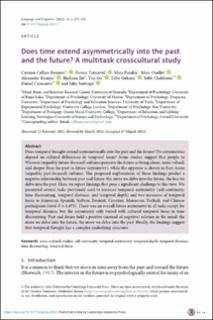Does time extend asymmetrically into the past and the future? A multitask crosscultural study
Callizo-Romero, Carmen; Tutnjević, Slavica; Pandza, Maja; Ouellet, Marc; Kranjec, Alexander; Ilić, Sladjana; Gu, Yan; Göksun, Tilbe; Chahboun, Sobn; Casasanto, Daniel; Santiago, Julio
Peer reviewed, Journal article
Published version
Permanent lenke
https://hdl.handle.net/11250/3021684Utgivelsesdato
2022Metadata
Vis full innførselSamlinger
Sammendrag
Does temporal thought extend asymmetrically into the past and the future? Do asymmetries depend on cultural differences in temporal focus? Some studies suggest that people in Western (arguably future-focused) cultures perceive the future as being closer, more valued, and deeper than the past (a future asymmetry), while the opposite is shown in East Asian (arguably past-focused) cultures. The proposed explanations of these findings predict a negative relationship between past and future: the more we delve into the future, the less we delve into the past. Here, we report findings that pose a significant challenge to this view. We presented several tasks previously used to measure temporal asymmetry (self-continuity, time discounting, temporal distance, and temporal depth) and two measures of temporal focus to American, Spanish, Serbian, Bosniak, Croatian, Moroccan, Turkish, and Chinese participants (total N = 1,075). There was an overall future asymmetry in all tasks except for temporal distance, but the asymmetry only varied with cultural temporal focus in time discounting. Past and future held a positive (instead of negative) relation in the mind: the more we delve into the future, the more we delve into the past. Finally, the findings suggest that temporal thought has a complex underlying structure. Does time extend asymmetrically into the past and the future? A multitask crosscultural study

